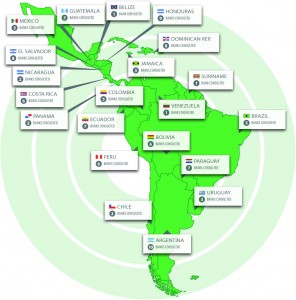 An annual survey of banks in Latin America and the Caribbean regarding the small and medium enterprise (SME) sector shows overwhelming interest in SMEs as banking clients. Ninety-six per cent of the 100 banks interviewed in 21 countries in Latin America and the Caribbean consider SMEs to be a strategic part of their business, and 92 per cent have a dedicated financing policy for SMEs in place.
An annual survey of banks in Latin America and the Caribbean regarding the small and medium enterprise (SME) sector shows overwhelming interest in SMEs as banking clients. Ninety-six per cent of the 100 banks interviewed in 21 countries in Latin America and the Caribbean consider SMEs to be a strategic part of their business, and 92 per cent have a dedicated financing policy for SMEs in place.
The sixth edition of the survey “SMEs in Latin America and the Caribbean: Closing the Gap for Banks in the Region” was commissioned by the Multilateral Investment Fund (MIF), a member of the Inter-American Development Bank (IDB) Group. It was produced with support from the Inter-American Investment Corporation (IIC), the IDB’s Structured and Corporate Finance Department (SCF), and the Latin American Banking Federation (Felaban). It is the sixth in a series of banking surveys on SME finance and was again conducted by the Argentinean consulting firm D’Alessio.
Eighty-two per cent of the banks surveyed have specialised loan programmes for SMEs, and 67 per cent consider themselves to be specialised in SME financing.
Additionally, the banks’ outlook for the SME sector is optimistic. More than half of the banks interviewed (54 per cent) believe that SMEs’ economic situation will improve in the next two years.
The majority of the banks forecast increases in their own SME loan portfolios – half of respondents predict a growth rate between one and 20 per cent, and another one- fourth believe it will grow between 21 and 40 per cent.
Differentiated services
This year’s survey shows that banks in the region have begun to develop differentiated services for small enterprise and for medium enterprise clients.
Seventy-two per cent of the banks interviewed have differentiated services for each of the small and medium enterprise segments, such as establishing adequate marketing strategies, internal procedures, underwriting methodologies, and risk management for each segment.
Eighty-five per cent of the respondents have a different risk analysis tool for small enterprises from that of medium enterprises.
One in four banks cites the informality of many SMEs as the main constraint to serving SMEs.
Some banks have begun to develop innovative under writing methodologies and credit scoring models, such as “psychometric” tests, to overcome the restrictions that informality may cause.
For the second year in a row, the survey included questions about the presence of SMEs managed or led by women in bank portfolios.
Analysing this issue remains a challenge, as more than half of the banks in the region (51 per cent) do not collect data disaggregated be gender. However, of the banks that do collect such data, 65 per cent use it to make decisions.
SME financing
Other topics explored in detail by the survey include trends in SME financing and products, credit methodology, and financing sources.



